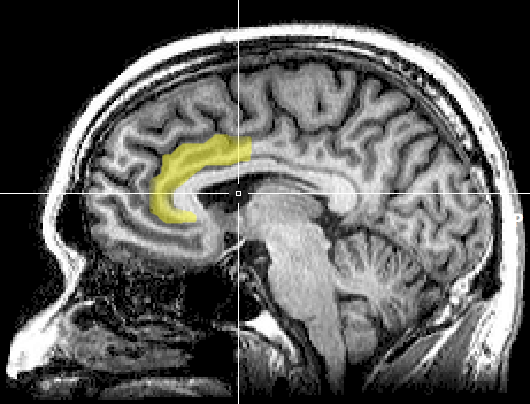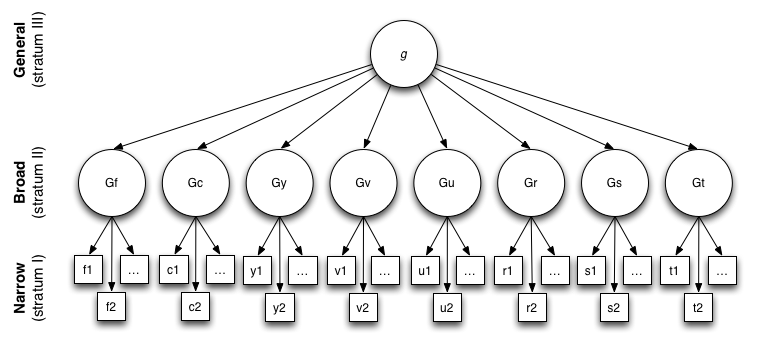|
Fluid Intelligence
The concepts of fluid intelligence (''g''f) and crystallized intelligence (''g''c) were introduced in 1943 by the psychologist Raymond Cattell. According to Cattell's psychometrically-based theory, general intelligence (''g'') is subdivided into ''g''f and ''g''c. Fluid intelligence is the ability to solve novel reasoning problems and is correlated with a number of important skills such as comprehension, problem-solving, and learning. Crystallized intelligence, on the other hand, involves the ability to deduce secondary relational abstractions by applying previously learned primary relational abstractions. History Fluid and crystallized intelligence are constructs originally conceptualized by Raymond Cattell. The concepts of fluid and crystallized intelligence were further developed by Cattell and his former student John L. Horn. Most of the intelligence testing had mainly been focused on children, and young adults. Cattell and Horn wanted to see how intelligence changed and ... [...More Info...] [...Related Items...] OR: [Wikipedia] [Google] [Baidu] |
Malleability Of Intelligence
Malleability of intelligence describes the processes by which intelligence can increase or decrease over time and is not static. These changes may come as a result of genetics, pharmacological factors, psychological factors, behavior, or environmental conditions. Malleable intelligence may refer to changes in cognitive skills, memory, reasoning, or muscle memory related motor skills. In general, the majority of changes in human intelligence occur at either the onset of development, during the critical period, or during old age (see neuroplasticity). Charles Spearman, who coined the general intelligence factor "g", described intelligence as one's ability to adapt to his environment with a set of useful skills including reasoning and understanding patterns and relationships. He believed individuals highly developed in one intellectual ability tended to be highly developed at other intellectual abilities. A more intelligent individual was thought to be able to more easily "accom ... [...More Info...] [...Related Items...] OR: [Wikipedia] [Google] [Baidu] |
Raymond Cattell
Raymond Bernard Cattell (20 March 1905 – 2 February 1998) was a British-American psychologist, known for his psychometric research into intrapersonal psychological structure.Gillis, J. (2014). ''Psychology's Secret Genius: The Lives and Works of Raymond B. Cattell''. Amazon Kindle Edition. His work also explored the basic dimensions of personality and temperament, the range of cognitive abilities, the dynamic dimensions of motivation and emotion, the clinical dimensions of abnormal personality, patterns of group syntality and social behavior, applications of personality research to psychotherapy and learning theory,Cattell, R. B. (1987). ''Psychotherapy by Structured Learning Theory''. New York: Springer. predictors of creativity and achievement, and many multivariate research methodsCattell, R. B. (1966). (Ed.), ''Handbook of Multivariate Experimental Psychology''. Chicago, IL: Rand McNally. including the refinement of factor analytic methods for exploring and measuring these ... [...More Info...] [...Related Items...] OR: [Wikipedia] [Google] [Baidu] |
Anterior Cingulate Cortex
In human brains, the anterior cingulate cortex (ACC) is the frontal part of the cingulate cortex that resembles a "collar" surrounding the frontal part of the corpus callosum. It consists of Brodmann areas 24, 32, and 33. It is involved in certain higher-level functions, such as attention allocation, reward anticipation, decision-making, impulse control (e.g. performance monitoring and error detection), and emotion. Some research calls it the anterior midcingulate cortex (aMCC). Anatomy The anterior cingulate cortex can be divided anatomically based on cognitive (dorsal), and emotional ( ventral) components. The dorsal part of the ACC is connected with the prefrontal cortex and parietal cortex, as well as the motor system and the frontal eye fields, making it a central station for processing top-down and bottom-up stimuli and assigning appropriate control to other areas in the brain. By contrast, the ventral part of the ACC is connected with the amygdala, nucleu ... [...More Info...] [...Related Items...] OR: [Wikipedia] [Google] [Baidu] |
Three-stratum Theory
The three-stratum theory is a theory of cognitive ability proposed by the American psychologist John Carroll in 1993.J. B. Carroll (1997), "The three-stratum theory of cognitive abilities" in D. P. Flanagan, J. L. Genshaft et al., ''Contemporary intellectual assessment: Theories, tests, and issues'', Guilford Press, New York, NY, USA, pp. 122-130. It is based on a factor-analytic study of the correlation of individual-difference variables from data such as psychological tests, school marks and competence ratings from more than 460 datasets. These analyses suggested a three-layered model where each layer accounts for the variations in the correlations within the previous layer. The three layers (strata) are defined as representing narrow, broad, and general cognitive ability. The factors describe stable and observable differences among individuals in the performance of tasks. Carroll argues further that they are not mere artifacts of a mathematical process, but likely reflect ph ... [...More Info...] [...Related Items...] OR: [Wikipedia] [Google] [Baidu] |
Spatial Intelligence (psychology)
Spatial intelligence is an area in the theory of multiple intelligences that deals with spatial judgment and the ability to visualize with the mind's eye. It is defined by Howard Gardner as a human computational capacity that provides the ability or mental skill to solve spatial problems of navigation, visualization of objects from different angles and space, faces or scenes recognition, or to notice fine details. Gardner further explains that Spatial Intelligence could be more effective to solve problems in areas related to realistic, thing-oriented, and investigative occupations. This capability is a brain skill that is also found in people with visual impairment. As researched by Gardner, a blind person can recognize shapes in a non-visual way. The spatial reasoning of the blind person allows them to translate tactile sensations into mental calculations of length and visualizations of form. Spatial intelligence is one of the nine intelligences on Howard Gardner's theory of mul ... [...More Info...] [...Related Items...] OR: [Wikipedia] [Google] [Baidu] |
Outline Of Human Intelligence
The following outline is provided as an overview of and topical guide to human intelligence: Human intelligence is, in the human species, the mental capacities to learn, understand, and reason, including the capacities to comprehend ideas, plan, solve problems, and use language to communicate. Traits and aspects In groups * Collective intelligence * Collective wisdom * Common sense In individuals Augmented with technology * Humanistic intelligence Capacities Cognition and mental processing Types of people, by intelligence High * Child prodigy ** List of child prodigies * Genius * Polymath Low * Intellectual disability Models and theories * Cattell–Horn–Carroll theory * Fluid and crystallized intelligence * General factor of intelligence * Theory of multiple intelligences * Triarchic theory of intelligence * PASS theory of intelligence * Parieto-frontal integration theory * Vernon's verbal-perceptual model * g-VPR model Related factor ... [...More Info...] [...Related Items...] OR: [Wikipedia] [Google] [Baidu] |
Nootropic
Nootropics ( or ) (colloquially brain supplements, smart drugs, cognitive enhancers, memory enhancers, or brain boosters) are chemical substances which purportedly improve cognitive functions, such as attention, memory, wakefulness, and self-control. In the United States, nootropics can be over-the-counter drugs and commonly advertised with unproven claims of effectiveness for improving cognition. The Federal Trade Commission and FDA have warned manufacturers and consumers about possible advertising fraud and marketing scams concerning nootropic supplements. Nootropics include both prescription drugs and dietary supplements marketed to enhance brain function, but while FDA-approved drugs have proven benefits and oversight, many dietary supplements lack evidence, may contain unapproved or hidden drugs, and pose safety and regulatory risks.Nootropics: Drugs vs Dietary Supplements for Brain Health. Operation Supplement Safety. https://www.opss.org/article/nootropics-drugs- ... [...More Info...] [...Related Items...] OR: [Wikipedia] [Google] [Baidu] |
Intelligence
Intelligence has been defined in many ways: the capacity for abstraction, logic, understanding, self-awareness, learning, emotional knowledge, reasoning, planning, creativity, critical thinking, and problem-solving. It can be described as the ability to perceive or infer information and to retain it as knowledge to be applied to adaptive behaviors within an environment or context. The term rose to prominence during the early 1900s. Most psychologists believe that intelligence can be divided into various domains or competencies. Intelligence has been long-studied in humans, and across numerous disciplines. It has also been observed in the cognition of non-human animals. Some researchers have suggested that plants exhibit forms of intelligence, though this remains controversial. Etymology The word '' intelligence'' derives from the Latin nouns '' intelligentia'' or '' intellēctus'', which in turn stem from the verb '' intelligere'', to comprehend or perceive. In the M ... [...More Info...] [...Related Items...] OR: [Wikipedia] [Google] [Baidu] |
General Intelligence Factor
The ''g'' factor is a construct developed in psychometric investigations of cognitive abilities and human intelligence. It is a variable that summarizes positive correlations among different cognitive tasks, reflecting the assertion that an individual's performance on one type of cognitive task tends to be comparable to that person's performance on other kinds of cognitive tasks. The ''g'' factor typically accounts for 40 to 50 percent of the between-individual performance differences on a given cognitive test, and composite scores ("IQ scores") based on many tests are frequently regarded as estimates of individuals' standing on the ''g'' factor.Kamphaus et al. 2005 The terms '' IQ, general intelligence, general cognitive ability, general mental ability'', and simply ''intelligence'' are often used interchangeably to refer to this common core shared by cognitive tests.Deary et al. 2010 However, the ''g'' factor itself is a mathematical construct indicating the level of observed c ... [...More Info...] [...Related Items...] OR: [Wikipedia] [Google] [Baidu] |
Flynn Effect
The Flynn effect is the substantial and long-sustained increase in both fluid and crystallized intelligence test scores that were measured in many parts of the world over the 20th century, named after researcher James Flynn (academic), James Flynn (1934–2020). When intelligence quotient (IQ) tests are initially Standard score#Standardizing in mathematical statistics, standardized using a Sample (statistics), sample of test-takers, by convention the average of the test results is set to 100 and their standard deviation is set to 15 or 16 IQ points. When IQ tests are revised, they are again standardized using a new sample of test-takers, usually born more recently than the first; the average result is set to 100. When the new test subjects take the older tests, in almost every case their average scores are significantly above 100. Test score increases have been continuous and approximately linear from the earliest years of testing to the present. For example, a study published in ... [...More Info...] [...Related Items...] OR: [Wikipedia] [Google] [Baidu] |
CHC Theory
CHC may refer to: Health care * Centro Hospitalar de Coimbra (C.H.C.), a hospital complex in Coimbra, Portugal * Columbia Health Care * Community health center * Community Health Clubs in Africa * Community health council * Continuing healthcare Education * Calvert Hall College, a Catholic preparatory high school in Maryland, USA * Chavakachcheri Hindu College, a famous school in the Thenmarachchi region, Jaffna * Chestnut Hill College - a Catholic college in Philadelphia, PA * College of the Holy Cross, a college in Worcester, Massachusetts * Cornwall Hill College, a college in Pretoria, South Africa * Robert D. Clark Honors College at the University of Oregon in Eugene, Oregon Politics * Cooler Heads Coalition, an organisation of self-described scientists who reject the scientific consensus on climate change * Congressional Hispanic Caucus, in the Congress of the United States * Croatian Helsinki Committee, a human rights group Sports * Colonial Hockey Conference, an N ... [...More Info...] [...Related Items...] OR: [Wikipedia] [Google] [Baidu] |



